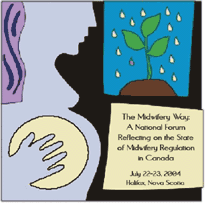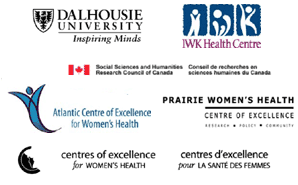 |
|||||||||||||||||
|
|||||||||||||||||
|
|||||||||||||||||
|
Proceedings from THE MIDWIFERY WAY A National Forum Reflecting on the State of Midwifery Regulation in Canada July 22 - 23, 2004 |
|
||||||||||||||||
|
Atlantic Centre of Excellence
for Women's Health Prairie Women's Health Centre of Excellence  INTRODUCTION INTRODUCTIONIt is a pleasure for the Prairie Women's Health Centre of Excellence and the Atlantic Centre of Excellence for Women's Health to present the proceedings from the Midwifery Way Forum we co-hosted in July 2004. We trust that readers will find within the proceedings a celebration of past achievements and considerations of how to ensure that midwifery is not only sustainable, but is supported in continued growth, for midwives and their clients. The key objectives from the Midwifery Way Forum were:
Our shared ultimate goal is to work toward improving maternity and newborn services across Canada so that all women have access to a comparable quality of women-centred care, no matter where they live or who they are. We believe that there is ample research, as well as first-hand accounts, that demonstrate the value of midwifery for advancing such an agenda. It has never been more imperative to ensure its integration into the publicly-funded health care system - a time when we face a maternity care crisis. We are very pleased that such a range of contributors (midwives, other health care practitioners, government bureaucrats, community leaders, consumers, activists, scholars, students, and others) shared their work for these proceedings. We want to thank all of our presenters, and roundtable participants for agreeing to participate in the Forum and to those who were able to share their work here. Due to the busy lives of midwives, not all presentations are represented in this document. Many of the presentations had to be altered because of the personal nature of photographs that were shared. Special thanks also to Rachel Rapaport Beck for liaising with contributors and editing, Pamela Chalmers for her formatting work and to Shelly Martin (assistant coordinator) who was absolutely indispensable in dealing with the multitude of details that ensure a smooth and enjoyable event! It is an exciting time for midwifery supporters and practitioners in Canada. As is clear from the contributors in this document, a great deal of research has been produced in the last ten years. It is conclusive: we are no longer debating the value or safety of midwifery care. This is a major accomplishment. But we must move the agenda forward. It is our hope that the Forum and these proceedings will contribute to and strengthen the midwifery movement in Canada. 
Back to top of page |
|||||||||||||||||
This website is copyrighted by the
Prairie Women's Health Centre of Excellence, © 1998-2011.
Website design: Pamela Chalmers E-mail: pwhce@uwinnipeg.ca. |
|||||||||||||||||
 |
|||||||||||||||||


 Full
Report ENG (.pdf) 6.1MB
Full
Report ENG (.pdf) 6.1MB